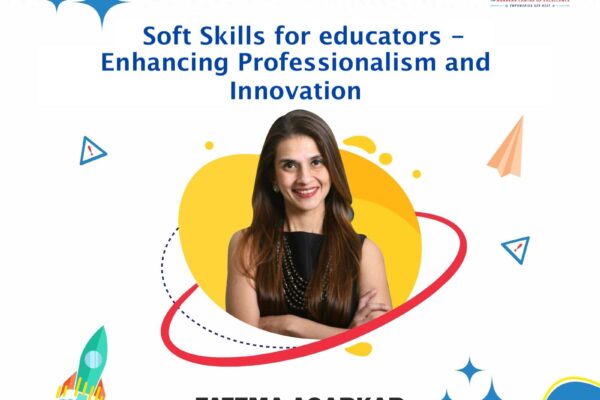The uncertainty surrounding school opening (for national board affiliated schools – start is usually June; international schools will commence in July/August and the thousands of preschools) is a guaranteed truth, and despite conversations with local authorities and administration it would be naive to believe that answers can be guaranteed at this point when the country is in a state of lockdown.
If research reports and authorised agencies tracking the developments are to be believed, India and its many States severely affected may well be peaking some time in May followed by a period of recovery till July, and that is only speculative as a large part of this will depend on the vaccination reach, citizen behaviour etc.
This makes the life of a Principal or a school leader in a day boarding or residential school quite challenging to say the least. With no concrete answers, how does one navigate plans for teachers, students, parents and conclude those brainstorming sessions with Managements?
At ACE, we have created a 10 point checklist to help you structure your thoughts:
- Setting up a War Room
Like what our local governments have adopted, create a specialised cell comprising of members of the PTA, senior staff members, administrative staff, ex parents, student council, medical professionals and a licensed third party agency (there are many that can guide about norms protocols etc) that meet regularly every two weeks to discuss developments and build capabilities and capacities (yes, I am aware we have these protocols for CBSE schools but quite frankly, these are more paperwork formalities than quality discussions). This collective wisdom and effort will go a long way in ensuring that the most well thought of systems and processes are in place. The macro outline for these discussions would include real time financial, administrative and academic developments and plans. Keep this active for the year, reducing the frequency to monthly when required.
- Acceptance of the 5 paths
Principals, must be ready with either of these possibilities:
- Complete on-line teaching
- Hybrid – online and at home
- Physical school for all
- Physical school for some grades
- Partial school (more experience based for some grades)
As a leader, it is important to think through all possible scenarios, using the experiences of the past, the trends and creating an SOS for each of the above.
The trick would be to create a global curriculum that can be modified and altered depending on circumstances not creating a ‘fresh’ one for each! Think about optimising delivery and not adding to the paperwork for teachers.
- Re-working Curriculum targets
If you are a preschool or a K-12, have complete clarity that the non-negotiable years will only be Grades 10 to 12 given they are ‘external’ examination years. Everything else, is in control of the school and what the school plans and ideates about its learning targets and goals. Therefore, there must be a re-think of the ‘content’ quantity vs quality. Most experts world over have concluded that ‘replicating’ the physical world as a virtual class resulted in challenges and in the long run may prove to be more catastrophic. Stay away from this temptation and rework. Think of what is non-negotiable in terms of knowledge, scaffolding in each grade level plan and subject and what can be deferred to a later time which does not impact the learning outcome. In our experience, a 20 percent ‘content’ reduction is feasible.
- Constant, regular communication with parents
There is this ‘shyness’ exhibited by school leaders to communicate with parents about what they are doing or thinking behind the scenes. Many have shared that parents ‘do not read’. This cannot be the excuse given for when individuals are explained the rationale, the steps taken to reach a decision, the acceptance levels will always be higher than when a decision is simply declared. This is a golden rule and cannot be ignored.
Set up grade coordinators who simply act at PRO’s for the parent community in those grades. This is different from the Section Coordinators. In my experience, when a teacher who is compassionate and balanced is leading the communication for her grade with parents, the dialogs are healthy, more personalised and solutions can be generated which makes it a win-win for teachers and the parents of ‘that’ grade.
Leaders think about this layer that gets added to make communication more effective and pointed. It could be through weekly voice notes, bulletins, video recordings or simply ‘coffee conversations’ with parents. The idea is to ensure that information is shared in a timely manner with what’s happening in school and also receiving information that will help the school plan better and also an understanding of the circumstances at home, which have a deep impact on how the teachers plan their standards.
- Addressing Assessments with clarity
Once again, plan for the worst case scenario. If you havent already built in capability to have an online system, this would be your first priority after you finish reading this blog. Invest in a system now, and do not think that building it internally will save you money. Some things are non negotiable and this one is! Also, ensure that your offline assessment plans are in place as well, and this is what at ACE we recommend highly:
- Multiple Unit wise assessments (after every chapter) using a combination of formative and summative and 3 Quarterly assessments as a broad view
- These become graded and get logged into a cumulative score – built in revision and scaffolding and also ensuring that the learning is on track
- Prior to the summative (quarterly) assessments, schedule PTM with parents, alerting them about the progress made by the child through the units, highlight their areas of improvement, and ensure that when they take those quarterly ‘tests’, they have fully prepared for optimisation of their learning.
- Allow for a re-test for the quarterly tests, if a child and the parent feel that the scores can be improved and allow for a grade correction. This is hugely motivating and remember this works well in a year when the finals may be cancelled because of a lockdown.
- Creativity in Time-Tabling
Restrict the urge to follow traditions with 8 to 10 periods a day, and consider blocks of 4-5. The length of classes also can be re-thought if is entirely online and instead consciously implement flipped classrooms as a mode of teaching. This builds in flexibility and also encourages students to take accountability- dont reserve this skill for home-work, instead think of introducing it before a topic commences. Success rates for this approach are extremely high.
Also follow this rule of thumb, after every 3 week, have a period of ‘unstructured’ time with the students- use events or problems they can solve and make it inter-grade interactions. This ‘break’ from the rut will help students broaden their horizon, and develop those critical life skills we keep speaking about but do not create meaningful engagements within the time-table to hone them.
This unstructured time could be a 2 Day Boot Camp and students can explore many subjects that are not part of their syllabus in schools. This could be lead by guest lecturers, enabling teachers a break as well and also learning from other experts.
Online or hybrid and even physical school timing in the initial days can be shortened as the world normalises! Think about it … they are not used to long hours … so transition them slowly.
- Designing a calendar around events
By Events, we do not mean the traditional celebrations of festivals, which by all means can continue, or the sports or annual concerts, but instead participation in local, national and international competitions or hosting them for other school students. This is a great way to mobilise the parent community into volunteering with ideas and network and reaching out to so many. From early years to high school, this exposure will be the defining moment as you build in social interactions for your children starved of this for many months.
- Skilling & Upskilling Teachers
As a leader, section wise, it is critical to know, your high performers (and highly motivated), your highly motivated but inexperienced teachers, your teachers that need absolute attention and mentoring (and subject matter support). For us at ACE, customising communication to help each of these categories makes a leader an effective executor when it comes to teaching-learning and knowing that some teachers may have the best plans on paper, but lack the charisma or the effectiveness when delivering a lesson plan with students. This needs careful understanding, handling and manoeuvring and needs to be tracked through the year. There needs to be a more focused approach to teaching as opposed to generic workshops. Think short and long terms goals for each other, and start with core facts instead of adding the ‘glamour’ topics. Fundamentals must be strong and class room management prior to scale ups!
Also, this is a ‘through-the year’ exercise, so then of peer-mentor, external resource people to monitor etc.
- Culture of Progressive Teaching – Learning
The onus for the next academic year must be re-visiting some concepts taught last year, as I would sincerely recommend to leaders to take a few months ‘revising’ these topics as refresher courses for it is important to have a strong foundation before you can build further. Remember the case of building collapsing? It is simply because the base was a result of some weak foundational strategies (the reason may not be ineffective teachers but differing circumstances in which students may have not picked up those targets).
There are many interesting approaches to learning from project based to interdisciplinary to gamification etc and many ideas of multi disciplinary and thematic to differentiation etc ….As a school, have a clear checklist for what minimum standards need to be reached looking at the capabilities of all teachers and resources available. I strongly believe that master a few before you attempt all, because this gets overwhelming for the teachers, and confusing for the students as well. The goal is that the child is learning with ease, not threatened and enhancing the knowledge base. But doing it happily, confidently and with ownership.
It would be worthwhile scheduling a school climate survey every quarter and generating feedback from parents and also a school audit conducted by an external agency to determine if the teaching-learning is on track and what can be done to optimise the gaps, if any.
- Research & Development
If this has not been part of the school plan, invest time and effort to create a cell that works towards building a repository of great ideas, best practices, resources, tools, tech platforms, videos etc that will help section wise, grade wise, subject wise and capability wise. This cell could well be the one who works with children with high abilities and those that need support for their specific learning challenges.
This is work-in-progress and this cell responsible for curating content will aid faculty delivery in a big way, because specialists will have a concentrated selection to pick from and then optimise the delivery mechanism!
- Outdoor experiences, field trips and co-curriculars
The next academic year if the physical schools are a possibility must be a year of social, emotional and physical experiences and there is no better way than incorporating a school calendar peppered with more co-curricular experiences for students. They need this to ‘normalise’ and ‘stabilise’ so leaders, do not eliminate this important part of your faculty, thinking that on-line may mean, they have no role. Short sighted this will come back to haunt you, so think about holistic development and your job as a leader to ensure that whatever the mode, you have the best and most prepared team to deliver.
While the above is a 10 point checklist there are hundreds of other things that need to be addressed. As a starting, we think setting realistic short terms goals will go a long way in ensuring that the year commences with ease.












